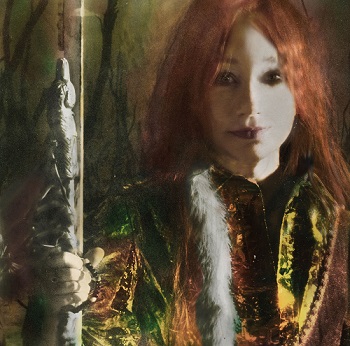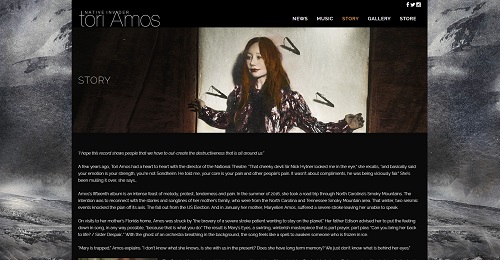|

songs | interviews | photos | tours | boots | press releases | timeline

press release | discography | photos | tour | story | interviews
Native Invader story
"I hope this record shows people that we have to out-create the destructiveness that is all around us."

A few years ago, Tori Amos had a heart to heart with the director of the National Theatre. "That cheeky devil Sir Nick Hytner looked me in the eye," she recalls, "and basically said: your emotion is your strength, you're not Sondheim. He told me, your core is your pain and other people's pain. It wasn't about compliments, he was being viciously fair." She's been mulling it over, she says...
Amos's fifteenth album is an intense feast of melody, protest, tenderness and pain. In the summer of 2016, she took a road trip through North Carolina's Smoky Mountains. The intention was to reconnect with the stories and songlines of her mother's family, who were from the North Carolina and Tennessee Smoky Mountain area. That winter, two seismic events knocked the plan off its axis. The fall out from the US Election. And in January her mother, Maryellen Amos, suffered a severe stroke leaving her unable to speak.
On visits to her mother's Florida home, Amos was struck by "the bravery of a severe stroke patient wanting to stay on the planet." Her father Edison advised her to put the feeling down in song, in any way possible, "because that is what you do." The result is "Mary's Eyes," a swirling, winterish masterpiece that is part prayer, part plea: "Can you bring her back to life? / Sister Despair..." With the ghost of an orchestra breathing in the background, the song feels like a spell to awaken someone who is frozen in ice.
"Mary is trapped," Amos explains. "I don't know what she knows, is she with us in the present? Does she have long term memory? We just don't know what is behind her eyes."
The Smoky Mountains road trip had come on the advice of Amos's sister, Doctor Marie Amos Dobyns, who attended medical school on a Native American scholarship, and belongs to the Association of American Indian Physicians. Through her sister, over the years, Amos has met many women doctors and nurses of the First Nations who, with their deep connection to both the healthcare system and the environment, kept her informed of the darker promontories of the American political landscape.
Her own political awareness goes back further. At thirteen, when she first went professional under the guidance of her father, Amos cut her teeth playing piano bar for the lobbyists of Washington DC. "I sat next to (Democrat) Tip O'Neill and played 'Bye Bye Blackbird' for him."
The complex influence of America's alt-right Super PACs, lobbyists and think tanks informs much of the tension in Native Invader. "It wasn't going to be a record of pain, blood and bone when I began," she says. "It wasn't going to be a record of division. But the Muses 9 insisted that I listened and watched the conflicts that were traumatizing the nation and write about those raw emotions. Hopefully people will find strength and resilience within the songs to give them the energy to survive the storms that we are currently in."
The sense of semantic distortion permeates Native Invader. Amos talks of the need to form a "militia of the mind" in the face of national lies. "Some people at these think tanks are masterful at turning words upside down," Amos says. "They use the word freedom and they are not giving you freedom. What's the difference between the book burning in Germany and the flood of misinformation in America right now?" In "Chocolate Song," "now vows and consonants our weaponry." On its close backdrop of vintage electronica, this is a song of pure impressionistic flair.
Hidden messages and subliminal protests lend themselves perfectly to Amos's natural playfulness. For all its dark themes, this album is a joy to absorb, full of warmth and puzzles. The gloriously odd "Bang" touches on themes of immigration, inspired by the words of the scientist Carl Sagan, who saw every human as a "molecular machine" made of "star stuff."
And in the fascinating "Benjamin," nostalgic sounds which recall early Casio synths meld into a lush seventies rock setting. The song is inspired by the groundbreaking court case Juliana Versus the US: a lawsuit filed by teenager Kelsey Juliana against the United States for failing to protect the environment. "Sucking hydrocarbon from the ground," Amos sings, "Those pimps in Washington are selling the rape of America as they attack Juliana."
"As a songwriter it's crucial to listen to everything and everyone." After the election she noticed more and more people reaching out to her, from old family friends to strangers in the street. "This is politics right now. It is seeping through the air. Families are falling apart."
At the center of Native Invader is this theme of division. The mythic "Reindeer King" talks about a mind divided from a soul, pleading "you gotta get you back to you," in a classic Amos melody that gets you right between the ribs. The deceptively laid-back "Cloud Riders" promises "I am not giving up on us": "Darlin' what's the blanket for/ We'll be riding out this storm."
"Up the Creek" is another stand-out track, its dark electronica recalling the energy of Amos's 1996 dance hit "Professional Widow." There are olde-time harmonies in there too, and a chorus which echoes her Native American grandfather's favourite saying, "Good Lord willin and the creek don't rise." It's about flood, foreboding -- and concern for parts of our world that are changing forever.
"Up the Creek" features the vocals of Amos's daughter Tash, whose struggles with teenage selfhood in the digital world have inspired her to think about divisions within the self, as well as within society. The myth of Persephone informs "Wildwood" -- with a mother, Demeter, waiting for the return of her abducted child.
Between 2011 and 2013 Amos spent a sabbatical in the classical world working with the German musicologist Dr. Alexander Buhr on her 2011 album Night of Hunters, and later with Samuel Adamson on her stage musical The Light Princess. Immersing herself in Debussy and Bartok "brought her back to a place of study."
This record may not be the one that Amos set out to make, but she is certainly the only person who could have made it. "It wasn't going to be a record of pain, blood and bone when I began," she says. "It wasn't going to be a record of division and conflict. But hopefully, it's a resilient record too."
[source: toriamos.com]

screen shot: December 17, 2017
t o r i p h o r i a
tori amos digital archive
yessaid.com
|



